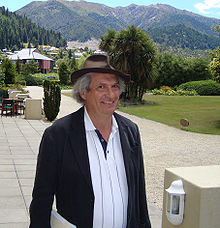- Persi Diaconis
-
Persi Diaconis (né le 31 janvier 1945) est un mathématicien américain qui fut auparavant magicien professionnel. Il est professeur de mathématiques et de statistiques à l'université Stanford. Il est particulièrement connu pour ses travaux sur des problèmes aléatoires, comme le battage de cartes.
Sommaire
Battage (ou mélange) de cartes
Diaconis acquit sa notoriété lorsqu'il fut lauréat du prix MacArthur en 1982, puis à nouveau en 1992, après la publication (avec Dave Bayer (en)) d'un article[1] qui établit de manière rigoureuse le nombre de fois que l'on doit mélanger à la queue d'aronde (mélange (en) dit « américain ») un jeu de cartes pour que celui-ci soit parfaitement aléatoirement mélangé, au sens de la distance de variation totale (en). Diaconis est souvent cité par la proposition simplifiée qui établit qu'il faut mélanger sept fois un jeu de cartes à l'américaine pour le mélanger. Plus précisément, Diaconis établit qu'il faut mélanger à l'américaine 5 fois un jeu de 52 cartes pour que la distance en variation totale tombe en dessous de 1, et 7 fois pour qu'elle tombe en dessous de 0.5, après quoi elle est divisée par deux à chaque mélange américain supplémentaire.
Diaconis a aussi collaboré à différents travaux en rapport avec des problèmes de mélanges de cartes, ou plus généralement d'autres problèmes en probabilités.
Récemment, certains auteurs ont argumenté que la distance employée était trop exigeante, et qu'il suffit de couper 6 fois pour un bon mélange[2].
Diaconis et des collaborateurs ont aussi publié[1],[3] des articles montrant que (avec leur mesure) il suffit de 4 coupes pour mélanger un jeu de blackjack.
Biographie
Il quitte son domicile familial à 14 ans pour suivre le légendaire prestidigitateur Dai Vernon, abandonne l'école pour ce faire, tout en se promettant d'y revenir afin de d'acquérir les mathématiques nécessaires à la compréhension du livre le célèbre traité de théorie des probabilités de William Feller An Introduction to Probability Theory and Its Applications. Il retourne en effet étudier au City College of New York qui le diplôme en 1971, puis s'engage dans une thèse à Harvard sous la direction de Frederick Mosteller (en), thèse qu'il soutient en 1974. Il obtient le prix Rollo Davidson en 1982.
Notes et références
- (en) D. Bayer et P. Diaconis, « Trailing the Dovetail Shuffle to Its Lair », dans Annals of Applied Probability, vol. 2, 1992, p. 294–313
- (en) L. N. Trefethen et L. M. Trefethen, « How many shuffles to randomize a deck of cards? », dans Proceedings of the Royal Society, Series A, vol. 456, n° 2002, octobre 2000, p. 2561–2568
- (en) « Theories of data analysis: from magical thinking through classical statistics », dans D. C. Hoaglin et al. (eds) Exploring Data Tables Trends and Shapes, Wiley, 1985
(en) Cet article est partiellement ou en totalité issu de l’article en anglais intitulé « Persi Diaconis » (voir la liste des auteurs)
Articles connexes
- Règle de Freedman-Diaconis (en)
- Marche aléatoire
Wikimedia Foundation. 2010.

